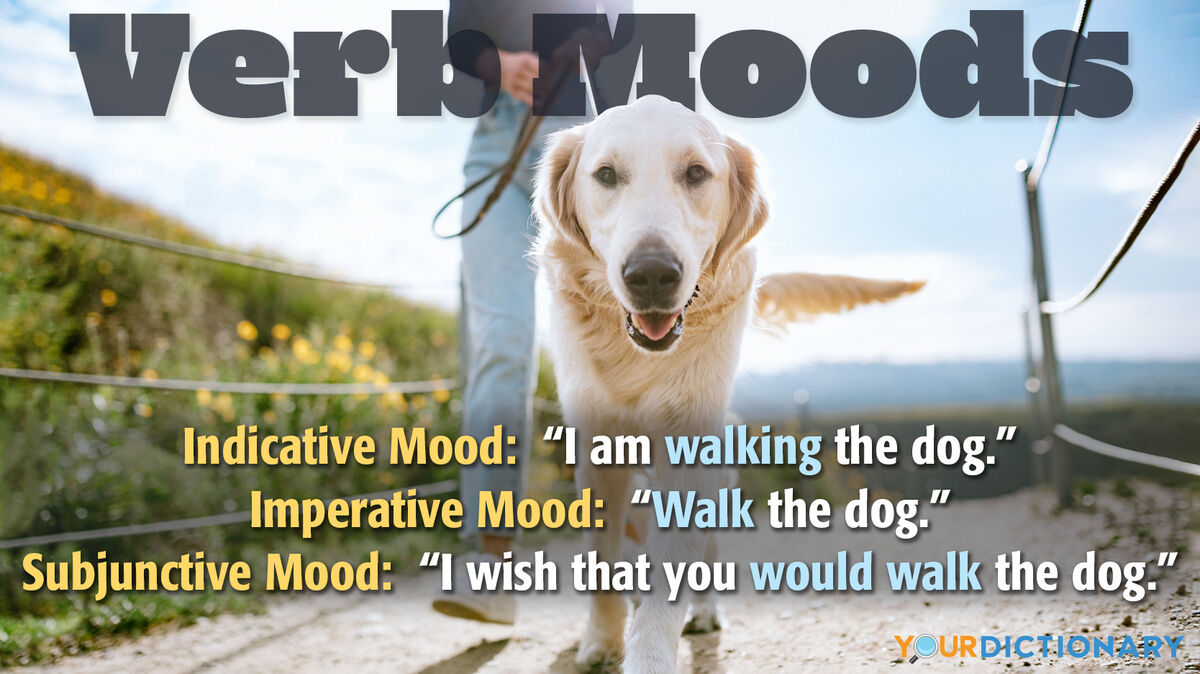
Mood doesn't always mean "feelings." Grammatical mood refers to the quality or form of a verb in a sentence. It denotes the tone of a verb in a sentence so the intention of the writer or speaker is clear. There are three basic verb moods: imperative, indicative and subjunctive. Take a closer look at each verb form with these explanations and examples of grammatical moods in English.
Indicative Mood
A sentence with an indicative mood expresses a factual statement, at least from the perspective of the speaker. Most sentences are written in the indicative mood, sharing facts or details that we perceive to be correct. In these sentences, the verb will express some sort of action, as a statement of fact.
Here are some examples of the indicative mood:
- Marie laughs whenever she sees him.
- Their new puppy walks quickly.
- Charlie read that book in less than a day.
- He enjoyed his dinner.
- She travels to Ireland frequently.
Imperative Mood
A sentence with an imperative mood makes a request or a command. These sentences don’t make mild suggestions. Rather, they issue a direct command, telling someone what to do.
In these sentences, the verb will express a direct call to action. Sometimes the subject “you” will be understood, as in the first example. Other times, it’ll be clear who the subject is.
Here are some examples of the imperative mood:
- [You] Move that book.
- Make sure Irene calls the store tomorrow.
- When you get home from school, walk the dog.
- At five o’clock, peel the potatoes for dinner.
- When you arrive at the airport, walk to Gate 52.
Subjunctive Mood
A sentence with a subjunctive mood expresses a condition that is doubtful, hypothetical, wishful, or not factual. The subjunctive verb in these sentences will show action, but it may not be based on reality.
Sentences in the subjunctive mood often include the phrase "If I were." The verb tends to express a doubt, wish, request, demand, proposal, or hypothetical situation.
Here are some examples of the subjective mood:
- If I were in your position, I’d never leave.
- Jane wishes her sons were faster at getting ready in the morning.
- The teacher requires all students be present for Thursday's event.
- Dr. Chandy suggested that Jerry run three times a week.
- She demanded Sean work the night shift.
Other Verb Moods
Although indicative, imperative and subjunctive moods are the main verb moods, there are several more you may encounter in English. Some reference guides would include conditional mood and interrogative mood as well as the three main moods.
Conditional Mood
A sentence with a conditional mood contains an auxiliary verb (a helping verb) and a main verb. You’ll be able to spot the conditional mood if you see the auxiliary verbs “would” or “should." Sentences in the conditional mood explain that one action is dependent on another.
Another telltale sign of the conditional mood is the “if this, then that” construct. “If/then” clearly indicates one action is dependent upon another. For example, “If she wasn’t so mean, then he would have helped her.”
Here are a few more examples of the conditional mood:
- We would live in Ireland if we secured the proper documents.
- If he wasn’t so late, then we would have had time for an afternoon snack.
- Knowing his history of bad behavior, she should have said no.
- After we go for a run, I would like some tea.
- If I lived in Ireland, then I would write a book.
Interrogative Mood
A sentence with an interrogative mood asks a question. This may make you think of interrogative sentences, which also ask a question.
When dealing with the interrogative mood, there will typically be two verbs. One will be an auxiliary verb. Again, you can think of an auxiliary verb as a helping verb to the main verb. It provides further clarification for the main verb of the sentence. Common auxiliary verbs include are, be, do, and have. In sentences with an interrogative mood, the auxiliary verb often comes before the subject of the sentence, and a question mark ends it for proper punctuation.
Here are some examples of the interrogative mood:
- Are you coming to the mall?
- When is your mother-in-law leaving?
- Where does he work?
- Did you bake a pie for Thanksgiving?
- Where have the students gone?
Set the Mood
When you think of all the rhetorical devices at your disposal — alliteration, hyperbole and personification, among others — many of them help set the mood of a piece of literature. While grammatical mood does not refer to emotion or feelings, it does convey a certain tone with the mood of the verb in a sentence indicating a fact, a command, a question, a condition, or a wish. If you'd like to see how grammatical moods work in other languages, check out a guide to subjunctive, indicative and imperative moods in Spanish.